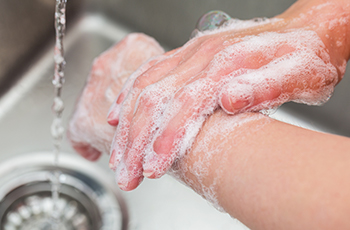
Do you secretly wish you owned a hazmat suit every time somebody sneezed near you? Kidding aside, no-body likes to catch the common cold or the flu.
The good news is, you can boost your odds of staying healthy all winter long by practicing these simple tips:
1. First and foremost, be in the know. While they often share symptoms, like runny/stuffy nose, cough and sore throat, colds and influenza are not the same thing. Only influenza viruses cause the flu, and sev-eral different types of viruses (e.g., rhinovirus and adenovirus) can cause colds. Antibiotics do not work for treating colds and the flu, but sometimes antiviral medications are prescribed to combat influenza.
In general, the flu is more aggressive, has more intense symptoms and lasts longer than the common cold. Serious cases of the flu can lead to hospitalization or even death. Older people, young children and people with chronic health conditions are at higher risk for developing serious flu complications. People who have the flu may experience:
- Fever or feeling feverish/chills
- Cough
- Sore throat
- Runny or stuffy nose
- Muscle or body aches
- Headaches
- Fatigue
- Vomiting and diarrhea (more common in children than adults)
2. Get your flu shot. The best way to prevent the flu is with a flu shot. A flu vaccine does NOT contain the live flu virus and therefore cannot cause the flu. Each year’s vaccine will protect against the flu viruses that Centers for Disease Control (CDC) researchers believe will be most common during that particular season. Although seasonal flu shots typically begin in September or October, as long as flu viruses are “in season,” it’s not too late to get the vaccine. Call your doctor’s office, or if it’s more convenient, Walgreens and CVS stores offer walk-in flu shots.
3. Sing “happy birthday” at the sink. Washing your hands frequently with soap and water for at least 40 seconds (about the time it takes to sing “happy birthday” twice) reduces the spread of germs. If soap and water aren’t available, use hand sanitizer.
4. Practice sneezing and coughing etiquette. Cover your nose and mouth with a tissue or shirtsleeve when sneezing or coughing.
5. Eat right and stay well. Eat a healthy, well-balanced diet rich in vitamins A, C and E. Foods that can boost your immune system include milk, eggs, citrus fruits, vegetables and nuts.
6. Get your ZZZs. Without proper sleep, you increase your chances of getting sick. Adults need at least seven hours of sleep per night (children need more).
7. Kick those butts. If you smoke, don’t give up on quitting. Smoking kills the fibers in your nose and lungs that help prevent mucus from clogging these airways. If you’d need help, our Healthy Life Programs offers 1-on-1 tobacco free coaching.
8. Disinfect to protect. Regularly clean phones, computer keyboards and other frequently touched work-space/household items with a disinfectant.
9. Avoid contact with sick people. When possible, avoid close contact or shaking hands with someone who has visible signs of any type of respiratory infection.
Do you need a primary care or family doctor? Dr. Kristen Sumners is accepting new patients of all ages at Holland Hospital Family Medicine – Zeeland.